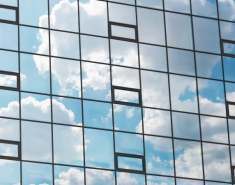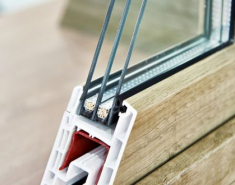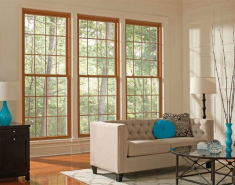Why would you choose aluminium windows and doors?
Back in the early 1980s, my family had aluminium sliding doors installed by a company that was, ahem, not Everest. The aluminium frame was an ugly metal strip, they didn’t close properly and I remember my mum having a blistering phone call with the managing director to complain. In short, not good.
Aluminium doors and windows have come a long way since then. Today, chic black or subtle charcoal aluminium frames are the architect’s choice when it comes to modern new-build developments, where their sleek, slim lines help create stylish exterior facades.
Steve Camm, product design manager at Everest, says: “Aluminium is very trendy these days. A lot of architect-designed houses come with bi-fold doors, which Everest only makes using aluminium.”
Due to the strength of this metallic element, less of it is needed in the frame to hold in the glass and hardware. Aluminium is inherently strong, meaning you can fit in really big windows and doors without the need for bulky frame support. This maximises the glass area, which gives you the best possible aspect.
Mr Camm says: “It’s a much more modern look because the sight lines are much slimmer, which means more of your window will be glass.
“The fact that you get to use more glass is a massive benefit to some people. The majority of your window will be glass, not frame, and therefore thermally efficient.”
Developments in thermal technology mean that aluminium windows and doors are among the best-insulated on the market, owing to thermal breaks. Whereas uPVC and timber can expand and contract when the ambient temperature changes, aluminium is highly stable – there’s no expansion or contraction that would make doors difficult to open or close.
“Aluminium has the potential to outperform uPVC for insulation when it comes to larger glass areas, because glass is an excellent insulator and we have to line uPVC bars with steel, which does lower thermal performance,” explains Mr Camm.
Practically maintenance-free, aluminium doors and windows are strong, durable and highly corrosion-resistant. Unlike timber, they don’t need painting or staining to keep them weather-proof, and they won’t rust or corrode. They will also never rot, peel or flake.
Older properties often have steel-framed windows and doors. These materials don’t perform as well as aluminium when it comes to heat loss, although you may like their aesthetics. Aluminium windows make the perfect replacement, keeping the look you prefer while giving you all the benefits of modern windows.
Even better, aluminium frames are generally cheaper than timber, saving you money at the outset and in the long run.
Now, the above is true for most aluminium windows and doors. So what’s the Everest difference?
Of course, Everest could boast about its installation speed: bespoke windows and doors handcrafted at one of its two factories in Britain are installed within six weeks of purchase.
But it’s in the detail where Everest really excels.
The aluminium profile is insulated with a polyamide core, designed specifically to prevent heat transfer through the frame.
A 20mm argon-filled gap within the double glazing, combined with a double-rebated design and double draft-resistant seals, minimises heat loss and keeps more noise out.
Low E internal glass reflects heat back into the room, minimising energy loss.
TPE seals help improve weather resistance as the seals have no “memory” and therefore always return to their natural position.
Everest’s corrosion-proof frames exceed British Standards for weather performance.
A multi-point stainless-steel locking system, lockable ventilation and internal glazing beads for improved security also exceed British Standards for windows.
Low-iron outer glass pane improves window clarity.
What’s more, Everest is far less tolerant about gaps than other suppliers, which means its windows need less sealant and filler around the frame. Everest is also unique in that it uses an aluminium trim around the window edge for a neater finish on all but white-finish products.
The company backs this all up with a 25-year guarantee on the aluminium profile and a lifetime guarantee against fog and condensation between panes of the sealed unit.
And if the environment is a concern to you, aluminium is 100 per cent recyclable without loss of quality. This means that when your windows eventually need replacing, frames can be melted down and refabricated into something new. So you can rest assured that if you do decide to replace them, they can be recycled again and again.
Source: https://bit.ly/2r89fG1









